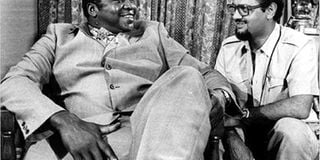Prime
Things we lost in the Amin fire

Idi Amin (below left)shares a light moment with Mohamed Amin, a photojournalist.
What you need to know:
Amin’s eight-year reign is best remembered for the brutality and murder of his henchmen, the expulsion of the Asians, and the collapse of the economy but the biggest loss suffered must be the death of institutions and the rule of law.
Kampala
The failure of the 1972 invasion by troops allied to the exiled Milton Obote allowed Idi Amin to entrench his rule in Uganda but it also provided the justification for widespread abuses.
Prof. Samwiri Karugire notes that the failed invasion “furnished Amin with a handy excuse to unleash his murder squads on the population with a renewed ferocity.” “From this point onwards, every segment of Uganda’s population suffered from Amin’s random terror: the army, the police, the prison staff, political leaders of every description, public officials and private individuals in all walks of life were massacred, all in the name of ‘National Security’.”
The process of dismantling state institutions had started during the Obote regime with the deployment of the army to bully political opponents, the abrogation of the constitution and the usurpation of power by the head of the executive.
Whatever was left was destroyed under Amin. Soon after taking over, Amin had abolished Parliament as well as the District and Urban councils and assumed legislative and executive powers. To give the regime some semblance of legitimacy, Amin would occasionally summon so-called elders for consultations but nothing substantive ever emerged out of the consultations.
Killing of ministers
Three organs of state were created: the Defence Council, which was the supreme ruling body; the cabinet and the national forum. The national forum was proposed in August 1973 but it only met once – in 1978 – and despite listening to a litany of complaints, the 1,000 representatives had no legislative power and were of no consequence.
Cabinet met more frequently but was subservient to the Defence Council and had no say in the all-important sphere of national security. On top of that, appointment to the Cabinet was often a poisoned chalice; historian Jen Jelmert Jorgensen notes in his book, Uganda: A Modern History, that “of 56 individuals who served in Amin’s cabinets between 1971 and 1979, six were killed in office or after being dismissed. These were M. Ondoga, S. Guwedekko, Charles Arube, C. Oboth-Ofumbi, Y. Engur, and E.W. Oryema. A seventh, Mathew Obado, died in April 1978 in mysterious circumstances.
Amin divided Uganda into 38 districts and 10 provinces but instead of making the country easier to manage, this made it easier for the mostly military governors of the provinces to terrorise the population. “In their provinces, these governors were warlords, plundering and killing as they chose, and subject to no restraint whatsoever,” noted Prof. Karugire. “When soldiers became county and sub-county chiefs, the villages of Uganda experienced terror directly, law and order disappeared altogether for those ‘chiefs’ strutted about everywhere with their arms, and since they knew nothing about administration, they did the only things with which they were familiar: plundering and killing.
Relations between the police and the army, long frosty because of the slightly better education among recruits to the former, became cold and bloody as the army “descended on the police with vengeance”, murdering senior police officers and forcing others to flee into exile. Those who left were replaced by untrained and half-baked recruits, many Sudanese amongst them, and the police, or what remained of it, soon became as fearsome and dreaded as the army and the para-military units.
Neither the civil service nor the judiciary were spared.
First, the judiciary received a severe body blow in September 1972 when Chief Justice Benedicto Kiwanuka was dragged from his office and murdered. More attacks continued on the judiciary until the dispensation of justice was taken over by military tribunals. The few regular court sessions that did take place dealt mostly with small crimes, and often had to operate under the nose of state thugs and security operatives. “In the upcountry courts, it became dangerous to try cases in which army, [Publis Safety Unit] or [State Research Bureau] personnel had an interest; magistrates either resigned or went into hiding rather than risk their lives,” according to Prof. Karugire.
“The law of the jungle prevailed and everyone had to look out for himself as best as he could.”
The civil service suffered damage that is has, in many respects, failed to recover from. Many civil servants were murdered, jailed, or forced to flee into exile. Those who remained continued to walk a thin line between death and irrelevance, as they attempted to advise a military government that had no patience or appreciation for bureaucracy and due process.
“Dismissal of civil servants ‘in the national interest’ became a regular feature on Radio Uganda so regular in fact that every morning all senior government employees had to listen to the ‘news’ on Radio Uganda to ensure that they were still in employment before venturing to their office,” wrote Prof. Karugire.
The expulsion of the Asians eroded a significant portion of the country’s intelligentsia and middle—class. Ugandans who belonged to both, were either murdered or forced to flee into exile. Religious leaders, who could have offered a voice of reason, were forced into silence after the murder of Janan Luwum, the Archbishop of the Anglican Church of Uganda.
While the soul of the country was being ripped out, Amin was involved in some amusing – and some times bizarre – exchanges with world leaders.




